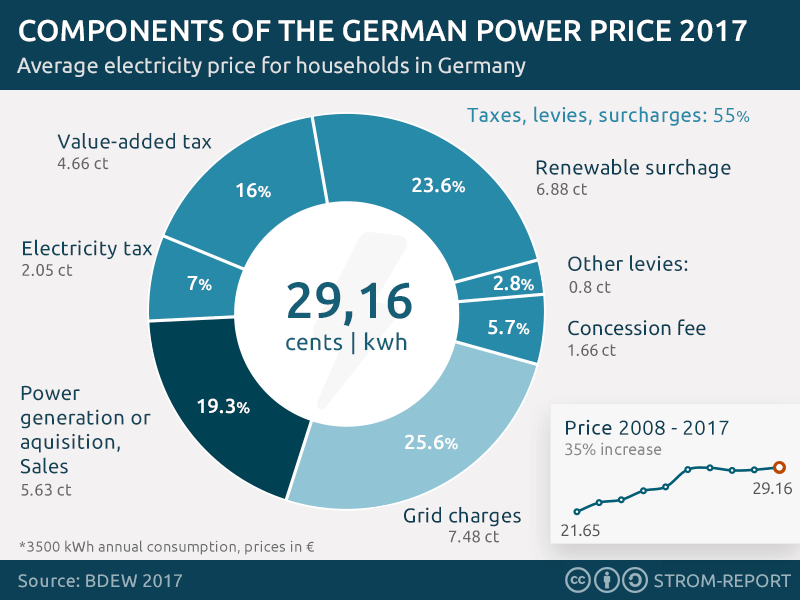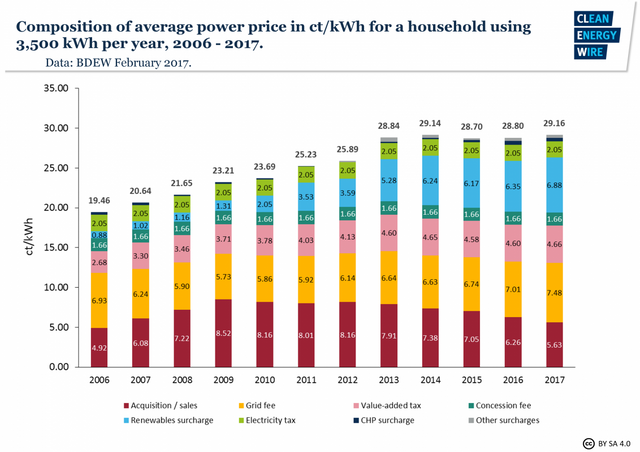Let’s Break it Down, the Cost of Electricity in Germany!
In my previous post I talked about Germany’s Feed-in Tariff policy and discussed some of the benefits and flaws that it had . To TLDR the post, Germany’s Feed-in Tariff is a policy that ensured fixed prices for people selling renewable energy to the grid for twenty years. When the price of purchasing a renewable system went down, the high fixed price of selling renewable energy to the grid stayed so that raised the price of consuming energy on the citizen side. Here I will be talking about the cost of energy for citizens because of the Feed-in Tariff and a few solution that may be able to help.

I could go on telling you the break down of a typical electricity bill but why not show some lovely graphs that make it very easy to understand! The first graph shows the pricing breakdown of power for consumers in 2017 while the second chart shows that price change from 2006-2017.

Approximately 55% of the cost of power is made up of surcharges, taxes and levies. Energy is not very expensive in Germany except when you add all the extra charges it increases the price so significantly. Because of the taxes and other charges, Germany’s power prices are among the highest in Europe. One of the largest cost is the surcharge which is the difference between the feed-in tariff and market price of electricity. I was able to get a chart straight from one of the people I interviewed electricity bill which shows that taxes and surcharges make up 73% of his bill. It’s crazy to see such a high percentage.
Like I mentioned in my previous post, some citizens are affected by the increased cost of energy because of their smaller disposable income. In an effort to help dampen price increases, the German government has introduced an amendment to the Feed-in Tariff that started at the beginning of 2017.
The amendment transitions the system from the feed-in tariff to an auction. People will now be bidding prices to have their renewable energy purchased onto the grid. Not everyone will be subject to this system right away but renewable plants over 750 kW are going to participate in the auction while plants under 750 kw will continue to have feed-in tariffs. One of the reasons for the change in the law is to help manage the growth of renewables and help meet Germany’s energy goals. Another benefit of the amendment is it will adjust renewables to be a more free market investment instead of the support the law originally was designed for. Now that alternative energies have become more mainstream, it is time to allow a more open market approach. Other options to help alleviate the cost of electricity is through lump-sum transfers, reduction on electricity taxes and additional subsidies to improve energy efficiency. I was curious to find out people’s opinion on the price of energy here in Berlin so I conducted a few interviews to get a sense. These accounts will be shared in my next post.
Resources:
"Renewable Energy Sources Act (EEG, Latest version EEG 2017)." The London School of Economics and Political Science, www.lse.ac.uk/GranthamInstitute/law/renewable-energy-sources-act-eeg-latest-version-eeg-2017/
Amelang, Soren. "Balancing the books: Germany's "green energy account"." Clean Energy Wire, 12 Feb. 2015, https://www.cleanenergywire.org/factsheets/balancing-books-germanys-green-energy-account
Thalman, Ellen, and Benjamin Wehrmann. "What German households pay for power." Clean Energy Wire, Energy, 16 Feb. 2017, https://www.cleanenergywire.org/factsheets/what-german-households-pay-power
Andor, Mark. "Germany's Energiewende: A Tale of Increasing Costs and Decreasing Willingness to Pay." Energy Journal, vol. 38, 2 May 2017, pp. 211-28
Chart Link:
Clean Energy Wire, https://www.cleanenergywire.org/factsheets/what-german-households-pay-power
Last Chart: Pie Chart snapshot taken from Vattenfall bill and translated by me
Way to keep up with the work. It seems like the youth do have some vision for the sustainability of our planet's future.
Downvoting a post can decrease pending rewards and make it less visible. Common reasons:
Submit
seems like things are getting done. love to see it.
Downvoting a post can decrease pending rewards and make it less visible. Common reasons:
Submit